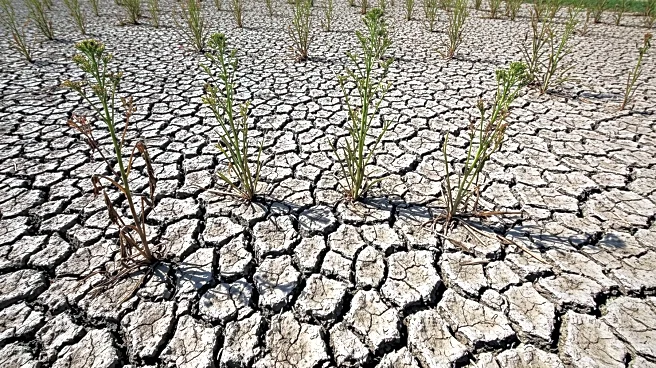What's Happening?
Arable farmers in Wiltshire are experiencing one of the worst harvests in decades due to exceptionally dry weather conditions. Tim Carson, a wheat farmer from Alton Barnes, reported that his farm's yield is significantly lower than usual, with only six tonnes of wheat per hectare compared to the typical nine to ten tonnes. The lack of rainfall during crucial growing months has led to dry soil and cracked ground, further damaging crop roots. Charlie Rudler, another farmer in the area, echoed similar concerns, noting the quality of wheat remains high, but the quantity is insufficient. Both farmers are facing increased costs without corresponding price increases for their crops.
Why It's Important?
The dry conditions in Wiltshire highlight the broader challenges faced by farmers due to changing weather patterns. This situation underscores the vulnerability of agriculture to climate variability, which can lead to financial instability for farmers. The reduced yield impacts not only the local economy but also contributes to wider concerns about food security and supply chain disruptions. As farmers struggle to adapt, there may be increased pressure on agricultural policy to support sustainable practices and provide financial assistance to those affected by adverse weather conditions.
What's Next?
Farmers like Tim Carson and Charlie Rudler are preparing to adapt to these changing conditions, acknowledging the need for new strategies in crop management. The ongoing dry spell may prompt discussions among agricultural stakeholders about investing in irrigation systems and other technologies to mitigate the impact of future dry years. Additionally, there may be calls for government intervention to support farmers through subsidies or grants aimed at improving resilience against climate-related challenges.
Beyond the Headlines
The situation in Wiltshire could serve as a case study for the impact of climate change on agriculture, prompting further research into sustainable farming practices. It also raises ethical questions about the responsibility of governments and industries to address climate change and support affected communities. Long-term shifts in farming practices may be necessary to ensure food security and economic stability in rural areas.










